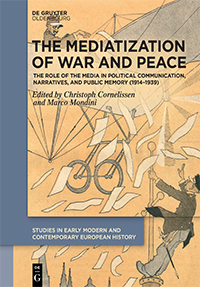The Mediatization of War and Peace
The Role of the Media in Political Communication, Narratives and Public Memory (1914-1939)
Christoph Cornelissen, Marco Mondini (edd)

Numero: 2
Editore: De Gruyter Oldenbourg
Città: Berlin/Boston
Anno: 2021
Cartaceo
Libro
During the First World War, mass media achieved an enormous and continuously growing importance in all belligerent countries. Newspaper, illustrated magazines, comics, pamphlets, and instant books, fictional works, photography, and the new-born “theater of imagery”, the cinema, were crucial in order to create a heroic vision of the events, to mobilize and maintain the consensus on the war. But their role was pivotal also in creating the image of the war’s end and finally, together with a widespread, new literary genre, the war memoirs, to shape the collective memory of the conflict for the next generations. Even before November 1918, the media raised high expectations for a multifaceted peace: a new global order, the beginning of a peaceful era, the occasion for a regenerating apocalypse. Likewise, in the following decades, particularly war literature and cinema were pivotal to reverse the icon of the Great War as an epic crusade and a glorious chapter of the national history and to create the hegemonic image of a senseless carnage. The Mediatization of War and Peace focalizes on the central role played by mass media in the tortuous transition to the post-war period as well as on the profound disenchantment generated by their prophesies.
Indice
Contents
Christoph Cornelissen and Marco Mondini
On the Mediatization of War and Peace since 1918/19
I. Visualization of War – Narratives of War
Marco Mondini
European War Literature in a Transnational Perspective
Christoph Cornelissen
When History Went Public. German Historians and Their Journalistic Work during the First World War and Its Aftermath
Hannes Leidinger
Visualizing the War. World War I as a Caesura in the History of (Visual) Media: A Relativization
Federico Mazzini
Mechanical Vaudeville. Popularization of Science and the Trivialization of War in the US (1915–1918)
II. Peace Illusions – The Media as Postwar Prophets
Michael S. Neiberg
“Where Did the Fourteen Points Go?”. The American Media and the Shantung Controversy
Leonard V. Smith
Woodrow Wilson in Europe: December 1918–February 1919. The Mediazation of Radicalized Liberalism
Étienne Boisserie
Asserting Czechoslovak Authority in Slovakia. Context and Obstacles in the Immediate Aftermath of the Great War
Mirko Saltori
Conceiving a “Just” Peace for Trentino. Aspirations, Disputes, Boundaries
III. From Hope to Disenchantment
Laurence van Ypersele
The Media and the Transition from War to Peace. The Role of the Media in the Popular Violence of November 1918, Belgium
Giovanni Bernardini
Media, Propaganda, and Revolution. France and the International Spread of Bolshevism in the Wake of World War I
Angelo Ventrone
The Italian Paradox: The Italian Media and the Myth of the Mutilated Victory
Pierre Purseigle
Devastated Victors. Reconstruction and the Urban Transition from War to Peace in Western Europe
IV. The Memory of Peace and the Media –
National and Regional Contexts
Peter Haslinger
Visions of Stability and Anxiety. The Mediatic Building of Nations and Border Regions, 1918–1930
Barbara Bracco
The Failed Exit from the War. The Problematic Return of Veterans and War Wounded in the Media (1918–1945)
Gabriele D’Ottavio
When the Decline of Europe Turned Topical. From World War I to Peace
Maurizio Cau
The Execution of Cesare Battisti. Representation and Memory of a Media Event
Contributors
Index
Parole chiave
- World War I
- Media History
- Mass Media
- Post-War Period

